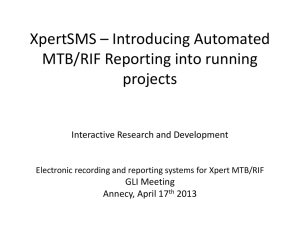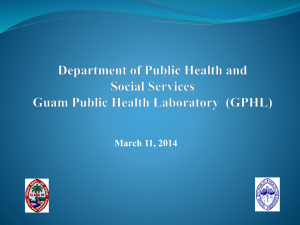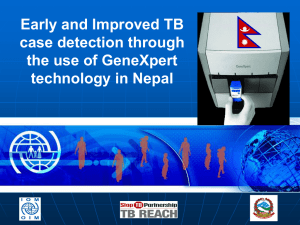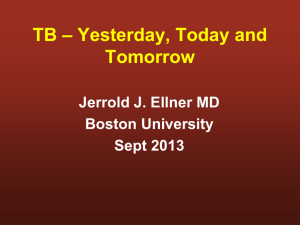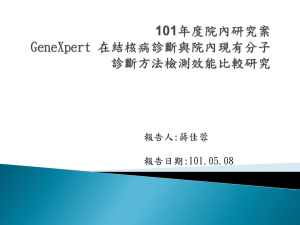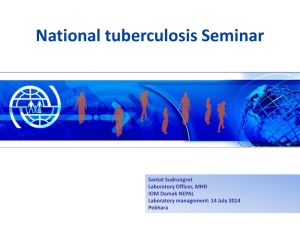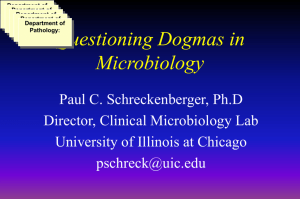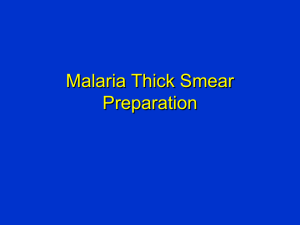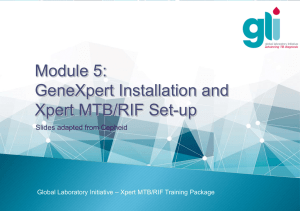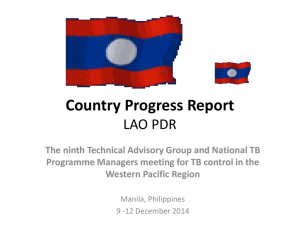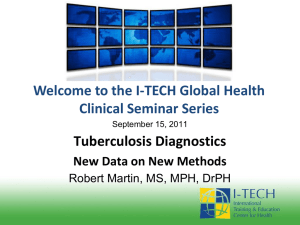GeneXpert
advertisement
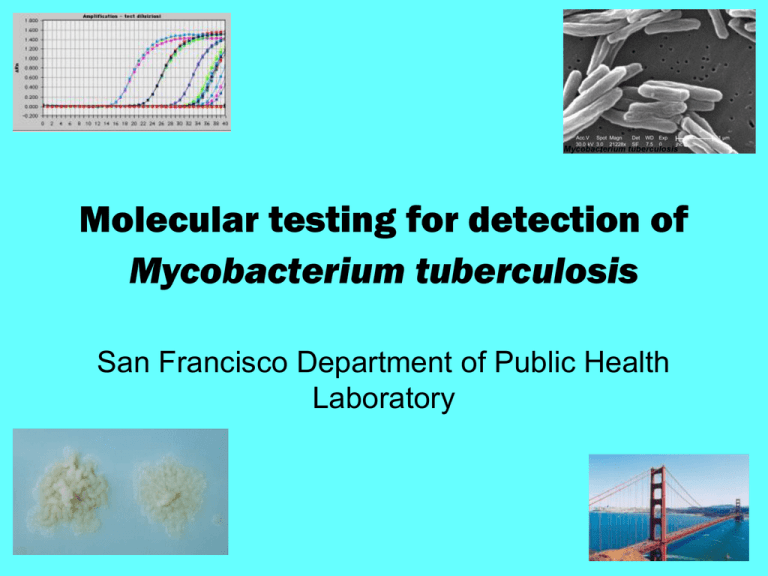
Molecular testing for detection of Mycobacterium tuberculosis San Francisco Department of Public Health Laboratory Aims • Molecular Testing for MTB: laboratory considerations and challenges • PCR-based testing at the SF Public Health Laboratory: GeneXpert (NOT FDA APPROVED) Challenges for NAAT use 2 FDAv approved NAA tests • Roche PCR and Gen-Probe MTD test– the only FDA-approved options – Roche test is leaving / has left – MTD is expensive and time consuming – MTD may be the most sensitive method Homebrew / RUO tests • All are PCR -based • Homebrew: rather inexpensive • Performance can be excellent (See Halse & Musser JCM 2010, NYS lab) But: • They can require much more initial set-up / quality control NAAT methods: challenges • Culture still rules: higher sensitivity -higher specimen volume is tested by culture than by NAAT (MTD & GeneXpert may be exceptions) -TB is a bit tougher than other organisms -sputum often doesn’t contain many MTB organisms (compared to viral specimens (herpes, flu etc..) for example) Another challenge: logistics (# of specimens tested) • Not necessarily a problem for all labs • for medium, small labs: often very few specimens per day: • Hence: – you either run the entire assay on one or two specimens each day, or – you batch specimens, run one day a week, and lengthen your turn around times (and tick a lot of MD’s off) PCR for TB The San Francisco Public Health Lab Experience 2007 to present Qiagen Real-Time (uses an IS6110 target) • Automated extraction: Roche MagNAPure LC • LightCycler real time PCR • Internal inhibition control • About 5 hours avg. from specimen to printed result The Qiagen Real-Time: Light Cycler (uses an IS6110 target) Sensitivity (culture as gold standard): • Smear many/numerous: 100% • Smear Few/Rare: 75% • Smear negative: 50% Specificity : 97.6% Data based on analysis of 108 prospective patient specimens (sputum concentrates) and 50 frozen specimen Qiagen RUO: issues – Sensitivity was not as good as MTD -we were getting 0 to 5 specimens per week, but running the test only on Wednesdays -was costing a lot of micro time for that one day whether it was 1 or 5 specimens. 2010 Switched to Cepheid, GeneXpert MTB/RIF -- NOT FDA APPROVED! -- The Device, Gene Xpert (Cepheid) • Single use cartridges • Extraction and amplification: in the cartridge • Fully Automated Using the Cepheid Gene Xpert: Clinical Specimen Treat with NALCNaOH and make concentrate Gene Xpert, results Nested PCR: rpoB gene • Take product of PCR 1, use as target in reaction 2 • Increase specificity by having two sets of primers needed for amplification • Increase sensitivity by amplifying target prior to second PCR 1. 2. Target DNA sequence: rpoB gene • The target of rifampin: RNA polymerase subunit B • PCR amplifies a small region relevant for rifampin resistance; uses 5 probes to assess for mutations probes Cepheid MTB: positive result • five probes -assay has an Internal PCR Control (for inhibition assessment) Test gives semi-quantitative results: “high”, “medium”, “low”, “very low” and “negative” Cepheid MTB: negative result Cepheid validation study Validation: Sensitivity: sputum concentrates that became culture positive: --13/13 smear numerous, culture positives: --30/32 smear few / rare: 100% 94% (missed one “few” and one “rare”) --29/40 smear negative, culture positives: 72.5% (Sm Neg/Cult Pos sensitivity of MTD test: ~72% (according to package insert) Specificity • 30 negative sputum concentrates – 0/30 positive Of those: - 10 smear+ / culture positive MOTTs tested: 0 were reactive --100% specificity Summary of sensitivities described in the literature: smear positive Moure et al (2011), JCM Boehme et al (2010) NEJM Marlowe et al (2011) JCM Helb et al (2010) JCM Armand et al (2011) JCM ND smear-negative 75.30% 98.20% 72.50% 98% 72% 98.40% 71.70% 100% 48% Rif Resistance • In search of specimens • 3 MGIT samples of resistant isolates tested: all three were called correctly • 3/85 (sputum) specimens were called Rif resistant– but phenotype testing showed otherwise • (96.6% specific) How we are using it How it is going… • Sputum only (concentrated) • Test is run: 3 days per week – Results follow: depending on when we get specimens: either same day or next day • All requests must go through public health TB control dept. • No RIF susceptibility results reported right now: not validated Prospective results of GeneXpert Since April, 2010: 126 matched GeneXpert, culture, smear specimens (since 4/2010) 17 confirmed MTB + : 15 positive by GeneXpert 2 negative by GeneXpert 3 called Rif resistant By GeneXpert 2 Rif resistant by culture (1 false call) 11 positive for MOTT, neg. for MTB 109 negative by culture 11 negative by GeneXpert 109 negative by GeneXpert The two “misses” by GeneXpert were each smear-negative. All 15 “hits” were smear-positive. Prospective results: • 100% sensitivity for smearpositive • 100% specificity • 0/2 on smear negative specimens so far • 67% PPV for rif resistance detection • 100% NPV for rif resistance detection Acknowledgements • Anna Babst, Senior Microbiologist • Jonathan Carlson, Microbiologist • Sally Liska, DrPH, Lab Director • • • • Masae Kawamura, MD TB Control Houmpheng Banouvong TB Control Luke Davis, MD, SFGH Adithya Cattamanchi, MD, SFGH
